#voter ID law
Explore tagged Tumblr posts
Text
North Carolina's Voter ID Law: A New Era of Voting
North Carolina’s Voter ID Law: A New Chapter After over a decade marked by intense court battles and legislative disputes regarding voting regulations, North Carolina recently conducted its first general election under the newly implemented voter ID law. Unlike the fierce confrontations of the past, this election seemed to reflect a quieter resolution, characterized by a more subdued ID…
#disenfranchisement#elections#general election#legal battles#North Carolina#photo identification#Republican lawmakers#voter ID law#voter turnout#voting regulations
0 notes
Photo








About 29 million Americans live in a state that passed new or stricter voter ID laws after the 2020 election — and every state has different voter ID requirements. 🪪
Make sure you know YOUR state’s voter ID rules before you head to the polls.
Swipe to learn more with us and our partners at VoteRiders, and check your state’s laws at WeAll.Vote/voterID. 🗳️
#voter id#voter id laws#vote#early vote#voter#early voter#voting#early voting#election#us election#general election#presidential election
112 notes
·
View notes
Text

77 notes
·
View notes
Text
USAmericans without Stable Housing:
Here is a guide to voting while unhoused!
Some key takeaways:
- You don’t need a permanent address to vote, but you do need a mailing address to receive election-related mail
- Reach out to your local unhoused services organization for help with this. You can also just ask a friend with an address or PO Box to allow you to receive mail there, or a church or other community organization.
- Your local election office is going to want your permanent address if and when you do have one to update your registration (or register you in your new state)
- You can check state by state ID laws here
- Reach out to your local election office for information about what other programs are available to you, potentially including
Anyways, if you don’t have stable housing, I know you probably have a lot on your plate, but if it feels accessible, the steps to use your vote are easier than you might be picturing. Here’s to using your voice to change the future of our country!
13 notes
·
View notes
Text
Something I had to retrain my brain about when it comes to voting:
It's not a test. It's not timed. You don't have to memorize the answers. You can use your phone to look up candidates and issues. If a local election doesn't list parties for candidates, you can look it up. If there are multiple Democratic candidates, you can check on which one has the best chance of winning. If a question is worded in a confusing way, as many of them are, you can look for clarifications.
You should definitely read up on your local ballot beforehand, but you don't have to rely on name recognition and guessing or skip sections entirely. Don't take pictures on your ballot or talk to people while you're in the booth, but you can take as much time as you need and use whatever resources you have with you to make the most of your vote.
Down-ballot elections are just as important in the long term as the big ones and typically have more direct impact on your daily life. Make your entire vote count, and don't let test anxiety make it harder.
#us politics#friendly reminder#also check if your state has voter id laws#and make sure you're registered to vote#useful information
27 notes
·
View notes
Text
So as we're heading into the American primaries, now is a super good time to see if you're registered to vote. Remember: even if you've been registered in the past, it's possible you've been removed from the registry without being notified. Go check.
Also, now's a really good time to put into your calendar when the relevant dates are for voting. If you plan on voting for election day, this link lists when that is in your state.
Note that voter ID laws may have changed since last time you voted. This map by ballotpedia shows the requirements by state. These rules may be different in the event that you are showing up to register and vote at the same time.

If you're unhappy with all of the options, remember that voting is not the only form of civic engagement you can engage in - getting engaged in your local community is still very much an option that is on the table and is effective. Voting and community organizing are not mutually exclusive acts. While the presidential race is the most prominent it is not the only race that's happening, and that local races that will affect your life far more directly are also on the ballot. Go vote.
#2024 primary#2024 election#politics#civic engagement#voting#voter registration#early voting#voting day#absentee ballot#voter id laws#voter id#american politics#democrat#republican#swing state#unlikely voter#democracy#presidential race#municipal elections#state elections
17 notes
·
View notes
Text
I have to admit that it has been WILD to see what comes out of the contingent of people who have decided to put all their eggs in the electoral basket as they seek to explain their logic to others. I keep seeing statements in these posts that I am absolutely sure people are just saying without recognizing the implications because they're scared but my god
#the amount of cruelty in how these posts are phrased#'if I can do [thing that is frankly fucking obscene to have felt compelled to do to exercise a basic right] to vote than so can you!!'#but like#we do remember that we've agreed not to victim blame people unable to overcome systemic oppression and disenfranchisement#i thought that if 'your legislators are restricting your vote' we felt empathy and responsibility not disdain and shame#my district has voter id laws that had me and wifey scrambling until literally TODAY to make sure at least one of us could legally vote#while on a technical level i am an 'eligible voter' legally even if i try to show up to vote I WILL BE SENT AWAY WITHOUT PROVISIONAL BALLOT#and i really think people's only concept of 'can't vote' is literally 'explicutly legally prohibited from voting' as opposed to#the understanding of voter suppression we have had literally since women and poc started seeking suffrage#you know the one where selectively applied laws and restrictions with asymetrical gatekeeping explicitly create plausible deniability
5 notes
·
View notes
Text
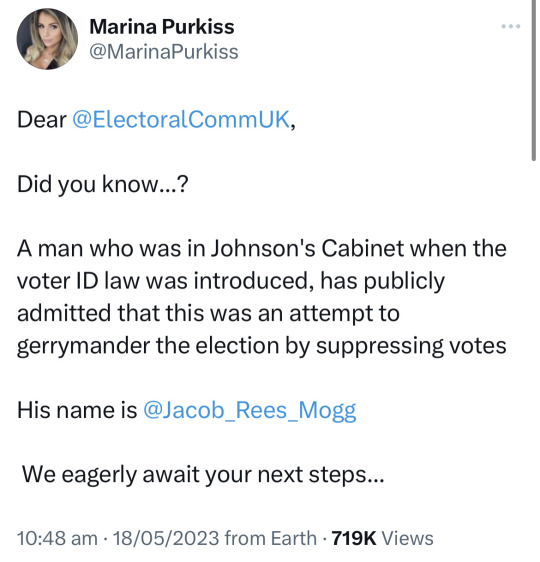
#marina purkiss#political twitter#boris johnson#jacob rees mogg#conservative party#gerrymandering#voter id#voter disenfranchisement#uk news#uk politics#uk law
26 notes
·
View notes
Text
Report: New DPS policy blocks changing sex on Texas driver's licenses
A new Texas Department of Public Safety (DPS) policy blocks transgender Texans from changing the sex on their driver's licenses or other forms of state ID.
According to a leaked DPS staff email sent to the Texas Newsroom, the new policy went into effect Tuesday, Aug. 20 and prohibits Texans from changing their listed sex even if presented with a court order or amended birth certificate. Sheri Gipson, the chief of the Driver License Division at the Texas Department of Public Safety, confirmed to KUT News' Lauren McGaughy Wednesday that the only way a Texan could change their sex is to fix a "clerical error."
"For current DL/ID holders, the sex established at the time of original application and listed in the driver record will not be changed unless there was a clerical error," the email leaked to KUT read. "The sex will reflect the sex listed on the primary document presented upon original application that is already on file."
"If a first-time applicant presents conflicting documents, such as a birth certificate with a court order requiring a sex change, the sex listed on the original birth certificate will take precedence to record the sex," the email continued.
Previously, the DPS would accept updates to an individual's sex if provided with a court order or updated birth certificate. The information about that prior policy has since been deleted from the DPS website.
The DPS did not immediately respond to Chron's question as to whether individuals who have already updated the sex on their licenses will retroactively fall under the new policy.
#TX politics#TX legal system#transphobia#note that TX also has voter ID laws#can't imagine this won't create problems for voting for trans people
2 notes
·
View notes
Text
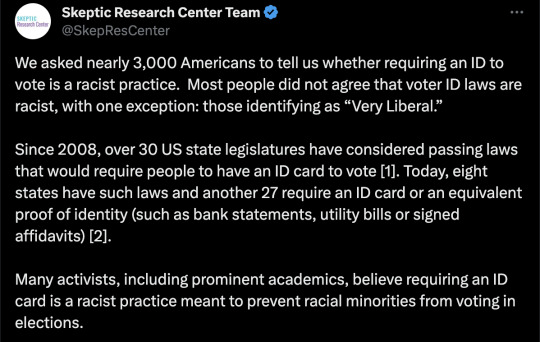
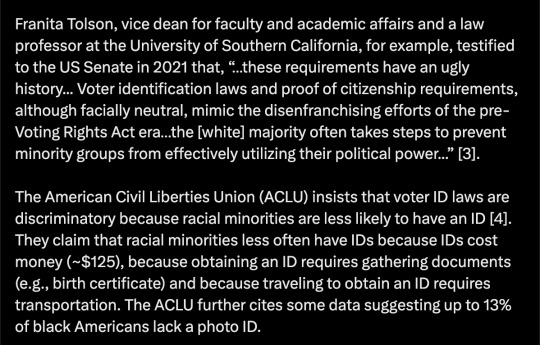
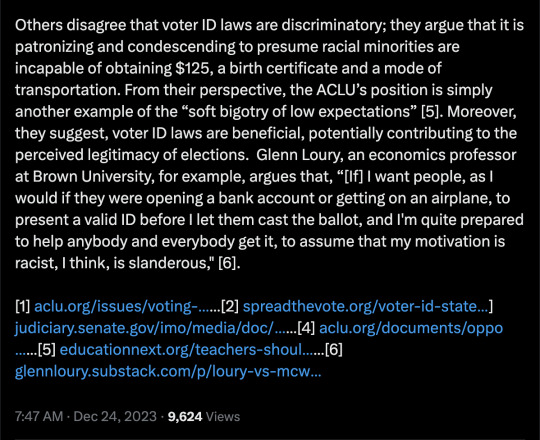
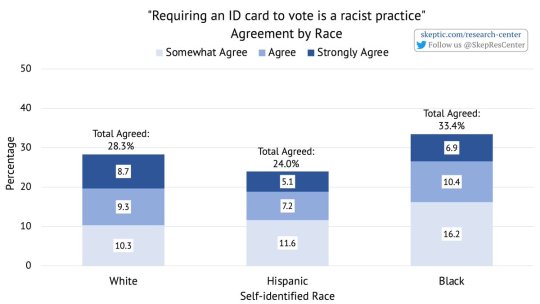


Links:
[1] https://www.aclu.org/issues/voting-rights/fighting-voter-suppression/fighting-voter-id-requirements
[2] https://spreadthevote.org/voter-id-states
[3] https://www.judiciary.senate.gov/imo/media/doc/Tolson%20Testimony1.pdf
[4] https://www.aclu.org/documents/oppose-voter-id-legislation-fact-sheet
[5] https://www.educationnext.org/teachers-should-replace-the-soft-bigotry-of-low-expectations-with-the-suspension-of-disbelief/
[6] https://glennloury.substack.com/p/loury-vs-mcwhorter-voter-supression
Original research paper:
https://www.skeptic.com/research-center/data-briefs/Data-Brief_VoterID.pdf
==
See also:
youtube
Reasons given by college students for why voter ID is "racist":
Black people less likely to have ID, or particular type of ID
Black people can't get to the DMV
Black people can't afford the internet
Black people don't know how to use the internet.
Black people don't have data on their phones or don't know how to use it
Black people are uninformed
Black people are often felons
Most of them appear to just be regurgitating ACLU talking points as virtuous "antiracism" activism and have never actually considered how infantilizing and actually racist these beliefs about black citizens are. It was genuinely shocking to me to hear these things come out of their mouths as virtuous progressive beliefs, rather than from a white Southern sheriff from the 60s.
Where I'm from, voter ID is required. It's not always requested, and I've only had to show mine a couple of times ever. But they do random spot checks and nobody thinks any more of it than showing your ID when you open a bank account or collect a parcel from the post office. (Seriously, how do they think black people pick up a parcel from the post office?)
Now, it's possible that there could be racial profiling when asking for voter ID, and that should certainly be addressed. But the idea that black Americans can live their entire lives in their own country without having an ID, knowing where the DMV Is or how to get there, and without being able to figure out the most basic aspects of "the internet" is full-blown progressive racism. That is actual white supremacy.
You would think after the elections of 2000, 2016 and 2020, there would be bipartisan agreement to improve the integrity of elections. But apparently not.
#Skeptic Research Center#voter ID#voter ID laws#progressive racism#neoracism#antiracism as religion#antiracism#election integrity#election interference#election denialism#election deniers#religion is a mental illness
8 notes
·
View notes
Video
youtube
Is 2024 the Last Election Women Can Vote If this Plot To Strip Women Of ...
This has some really important info.
I was not aware that voter ID laws disproportionality affect women. In some states, you can be asked to present your birth certificate alongside your driver’s license, but if your birth certificate doesn’t match your ID exactly, you can be turned away.
Most married women take their husband’s last name and thus would be affected by this. Also, it is apparently required by law to formally change your name with your state even when you’ve been married. It’s technically illegal (this may vary by state) to just start using your husband’s last name.
Apparently it’s never enforced, but this content creator is concerned that in the states with the strictest voter ID requirements, the states might start enforcing this type of thing in order to keep women from voting. Considering, of course, that women are expected to be the ones who will turn up to vote in droves due to all the anti abortion laws being enacted and the talks of a nationwide ban being the next step in the republican playbook. Because they think those damn women should just shut up and do what they’re told. And it’s not right that some of them can still travel out of state to get an abortion. /s
#youtube#thom hartmann#abortion#women#voting#united states#united states voting#voting laws#voter id#voter id laws#female voters#women voters#voter supression#video#psa#public service announcement
3 notes
·
View notes
Text
Getting a certified copy of your birth certificate costs $10-$34 dollars, depending on your state.
A passport costs $165.
This is a poll tax.


Basically republicans want to make it so your ID has to match your birth certificate which affects everyone from trans people to married women to immigrants.
Meanwhile, in GA, they're going to force all ballots to be hand counted, which could make it difficult to meet the deadline to certify the vote, and thus potentially allow them to give the state to Trump regardless of the outcome.
In many states, such as Ohio, Florida, Texas and North Carolina, they've been purging voters from the rolls by the millions.
If voting didn't matter, why are they trying so damn hard to stop us?
#which is unconstitutional#but widely used via voter ID laws#added on to the disenfranchisement of women voters#us politics#voter suppression
29K notes
·
View notes
Text

#caroline lucas#political twitter#conservative party#rishi sunak#anti strike laws#anti union laws#uk news#uk politics#uk economy#voter disenfranchisement#voter id
20 notes
·
View notes
Text
Please don't tune out when you get to the non-partisan section of your ballot this November. First off, where state Supreme Court justices are elected, Republicans are trying their darndest to elect candidates who will destroy reproductive freedom, gut voting rights, and do everything in their power to give "contested" elections to Republicans. Contrast Wisconsin electing a justice in 2023 who helped rule two partisan gerrymanders unconstitutional, versus North Carolina electing a conservative majority in 2022, who upheld a racist voter ID law and a partisan gerrymander that liberal justices had previously struck down both of.
Second, local judicial offices will make infinitely more of an impact on your community than a divided state or federal legislature will. District and circuit courts, especially, are where criminalization of homelessness and poverty play out, and where electing a progressive judge with a commitment to criminal justice reform can make an immediate difference in people's lives.
It's a premier example of buying people time, and doing profound-short-term good, while we work to eventually change the system. You might not think there will be any such progressive justices running in your district, but you won't know unless you do your research. (More on "research" in a moment.)
The candidates you elect to your non-partisan city council will determine whether those laws criminalizing homelessness get passed, how many blank checks the police get to surveil and oppress, and whether lifesaving harm reduction programs, like needle exchanges and even fentanyl test strips, are legal in your municipality. Your non-partisan school board might need your vote to fend off Moms for Liberty candidates and their ilk, who want to ban every book with a queer person or acknowledgement of racism in it.
Of course, this begs the question — if these candidates are non-partisan, and often hyper-local, then how do I research them? There's so much less information and press about them, so how do I make an informed decision?
I'm not an expert, myself. But I do think/hope I have enough tips to consist of a useful conclusion to this post:
Plan ahead. If you vote in person, figure out what's on your ballot before you show up and get jumpscared by names you don't know. Find out what's on your ballot beforehand, and bring notes with you when you vote. Your city website should have a sample ballot, and if they drop the ball, go to Ballotpedia.
Ballotpedia in general, speaking of which. Candidates often answer Ballotpedia's interviews, and if you're lucky, you'll also get all the dirt on who's donating to their campaign.
Check endorsements. Usually candidates are very vocal about these on their websites. If local/state progressive leaders and a couple unions (not counting police unions lol) are endorsing a candidate, then that's not the end of my personal research process per se, but it usually speeds things up.
Check the back of the ballot. That's where non-partisan races usually bleed over to. This is the other reason why notes are helpful, because they can confirm you're not missing anything.
I've seen some misconceptions in the reblogs, so an addendum to my point about bringing notes on the candidates: I strongly suggest making those notes a physical list that you bring polling place with you. Many states do allow phones at the polling place, but several states explicitly don't — Nevada, Maryland, and Texas all ban phones, and that may not be an exhaustive list. There may also be states that allow individual city clerks to set policies.
You should also pause and think before you take a photo of your ballot, because even some states that don't ban phones still ban ballot photographs. But whether it's a photo, or just having your phone in general — in an environment as high-risk for voter suppression as the current one, you don't want even a little bit of ambiguity about your conduct. Physical notes are your friends.
7K notes
·
View notes
